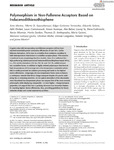Polymorphism in Non-Fullerene Acceptors Based on Indacenodithienothiophene

Use este enlace para citar
http://hdl.handle.net/2183/28274
A non ser que se indique outra cousa, a licenza do ítem descríbese como Atribución-NoComercial-SinDerivadas 4.0 Internacional
Coleccións
- GI-Polímeros - Artigos [32]
- OpenAIRE [359]
Metadatos
Mostrar o rexistro completo do ítemTítulo
Polymorphism in Non-Fullerene Acceptors Based on IndacenodithienothiopheneAutor(es)
Data
2021Cita bibliográfica
Marina, S., Scaccabarozzi, A. D., Gutierrez-Fernandez, E., Solano, E., Khirbat, A., Ciammaruchi, L., Iturrospe, A., Balzer, A., Yu, L., Gabirondo, E., Monnier, X., Sardon, H., Anthopoulos, T. D., Caironi, M., Campoy-Quiles, M., Müller, C., Cangialosi, D., Stingelin, N., Martin, J., Polymorphism in Non-Fullerene Acceptors Based on Indacenodithienothiophene. Adv. Funct. Mater. 2021, 31, 2103784. https://doi.org/10.1002/adfm.202103784
Resumo
[Abstract] Organic solar cells incorporating non-fullerene acceptors (NFAs) have reached remarkable power conversion efficiencies of over 18%. Unlike fullerene derivatives, NFAs tend to crystallize from solutions, resulting in bulk heterojunctions that include a crystalline acceptor phase. This must be considered in any morphology-function models. Here, it is confirmed that high-performing solution-processed indacenodithienothiophene-based NFAs, i.e., ITIC and its derivatives ITIC-M, ITIC-2F, and ITIC-Th, exhibit at least two crystalline forms. In addition to highly ordered polymorphs that form at high temperatures, NFAs arrange into a low-temperature metastable phase that is readily promoted via solution processing and leads to the highest device efficiencies. Intriguingly, the low-temperature forms seem to feature a continuous network that favors charge transport despite of a poorly order along the π–π stacking direction. As the optical absorption of the structurally more disordered low-temperature phase can surpass that of the more ordered polymorphs while displaying comparable—or even higher—charge transport properties, it is argued that such a packing structure is an important feature for reaching highest device efficiencies, thus, providing guidelines for future materials design and crystal engineering activities.
Palabras chave
Non-fullerene acceptors
Organic electronics
Organic semiconductors
Organic solar cells
Polimorphism
Organic electronics
Organic semiconductors
Organic solar cells
Polimorphism
Descrición
Financiado para publicación en acceso aberto: Universidade da Coruña/CISUG
Versión do editor
Dereitos
Atribución-NoComercial-SinDerivadas 4.0 Internacional






